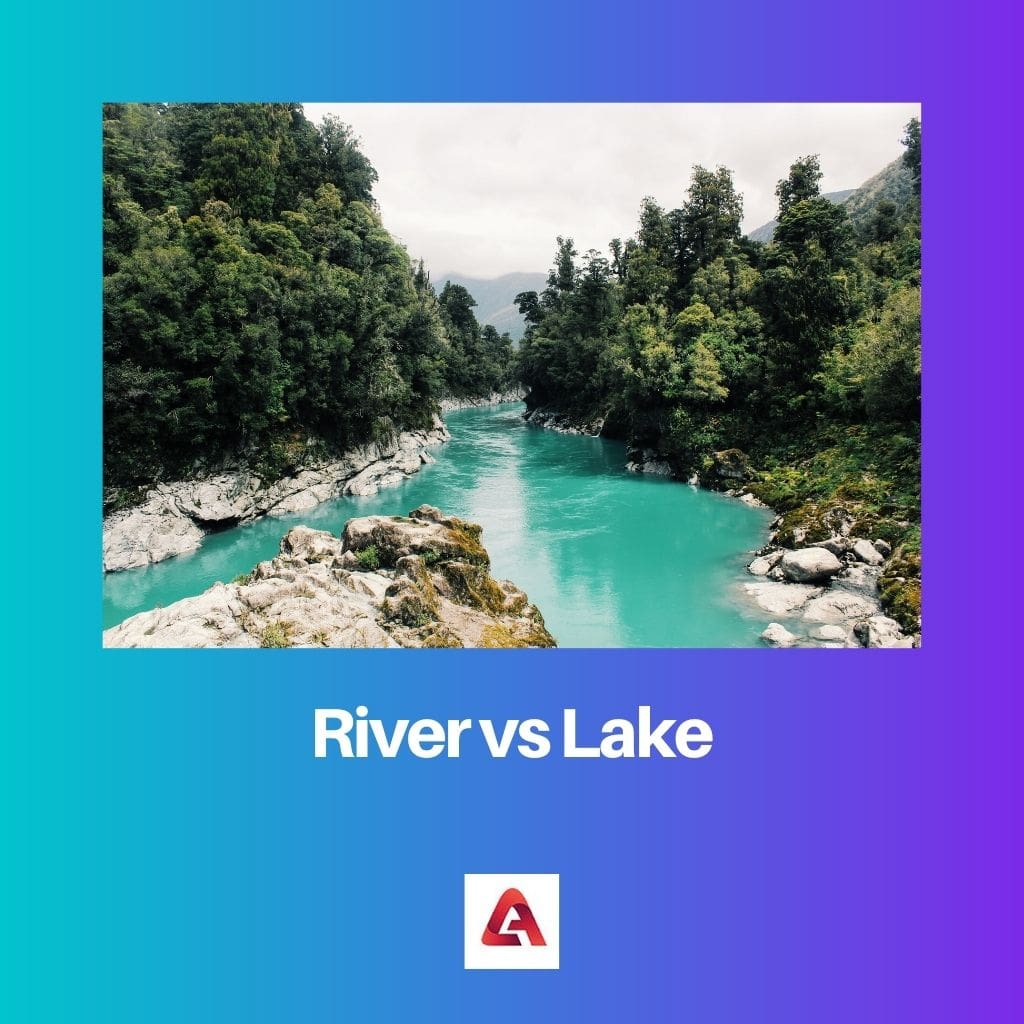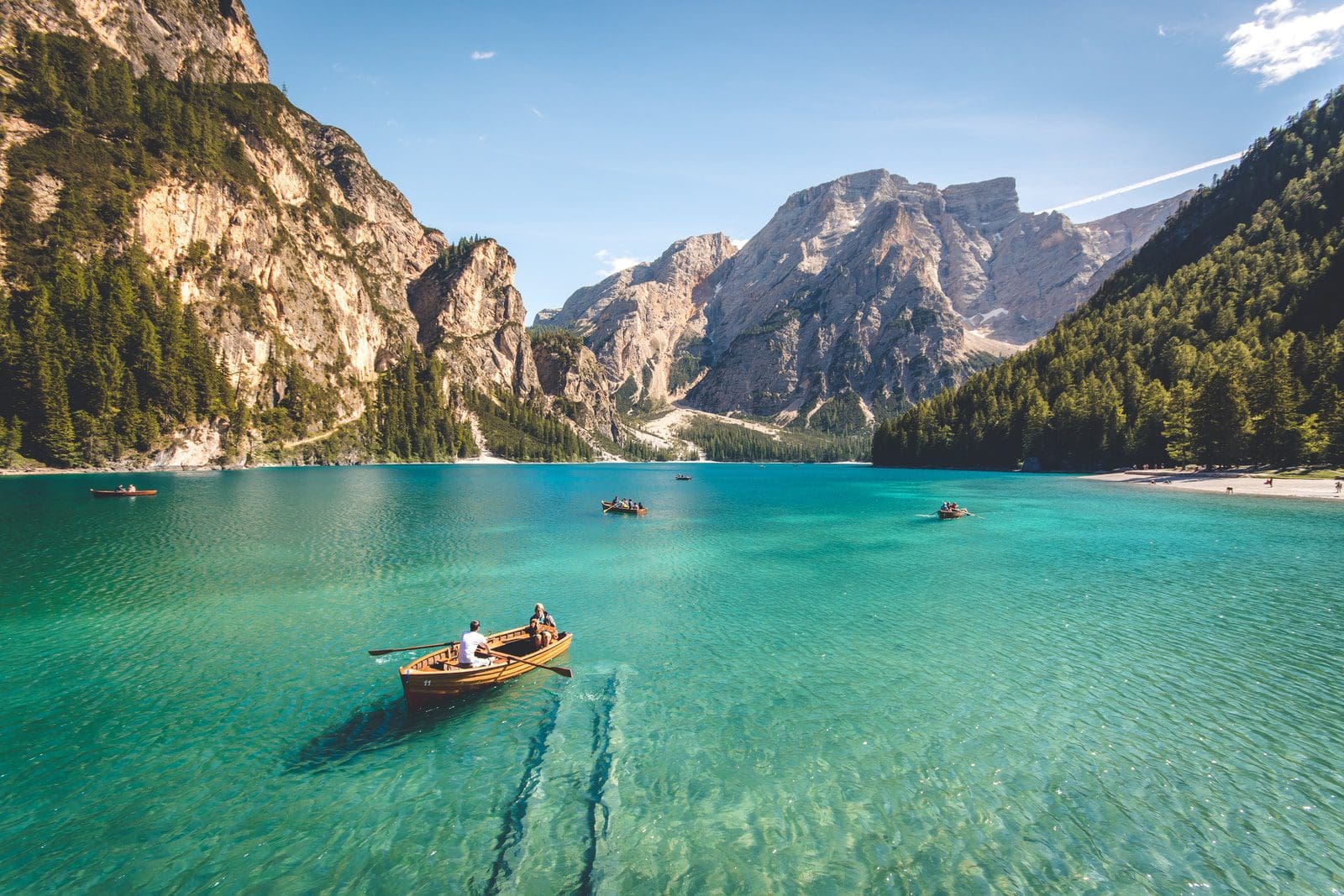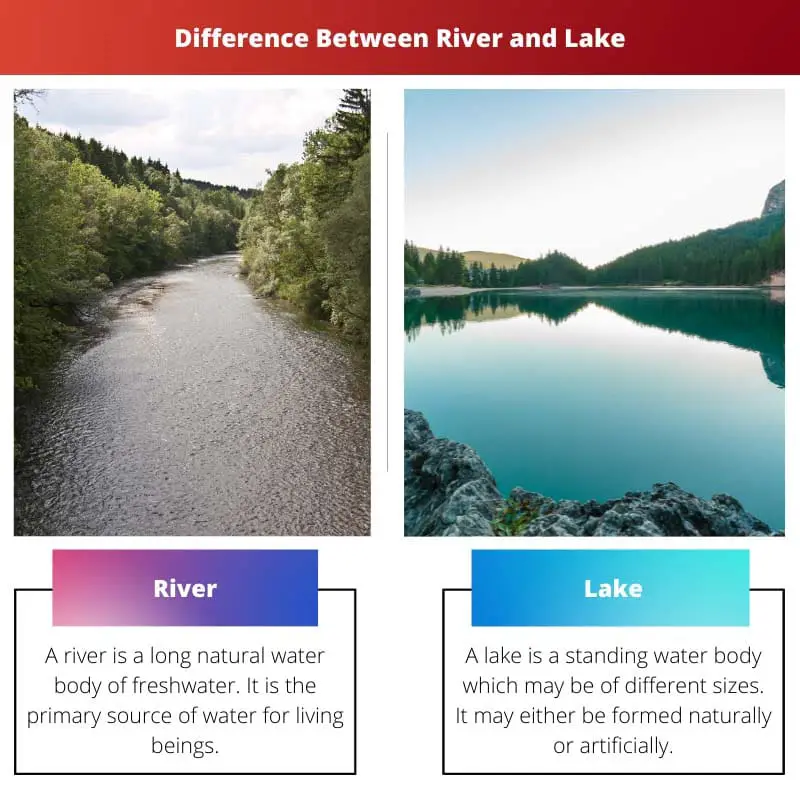A Waterbody is an accumulation of water, on the earth’s surface. These may include oceans, seas, lakes, rivers, and small water pools such as wetlands or ponds.
Some water bodies are naturally occurring, while some may be artificial.
Key Takeaways
- Rivers are flowing bodies of water that move along a defined path, connecting different areas and originating from a source like a spring or a melting glacier.
- Lakes are bodies of water surrounded by land and can be fed by rivers, streams, or underground springs, characterized by still or slow-moving water.
- Both rivers and lakes are bodies of water, but rivers flow along a path and connect different areas, while lakes are stationary and surrounded by land.
River vs Lake
A River is a moving body of freshwater that isn’t enclosed but is connected with other oceans or seas, and it was created naturally. A lake is a still body of water, which comes in different sizes but isn’t connected with seas or oceans, and it can either be natural or artificially made.

Rivers and Lakes are large water bodies of freshwater. A river is an unstable natural water body, i.e. it keeps moving.
On the other hand, a lake is still a water body. It can be natural or even artificial.
Lakes, reservoirs, and wetlands are essential in river ecosystems as they influence water quality and quantity.
Comparison Table
| Parameter of Comparison | River | Lake |
|---|---|---|
| Appearance | It looks like a snake. | It looks like a big pond. |
| Creation | It is a naturally occurring water body. | It may be natural or artificial. |
| Movement | A river is a moving water body. | A lake is a still water body. |
| Enclosure | It is not enclosed by land on all sides. | A lake is enclosed by land on all sides. |
| Connection | Rivers are connected with the seas or oceans. | Lakes are not connected to any sea or ocean. |
What is River?
A river is a long natural water body of freshwater. It is the primary source of water for living beings.
A river is a running water body from glaciers or high mountain ranges. It runs for hundreds of kilometres and ends at the oceans or seas.
The point from where the river originates is called the source, and its endpoint is called the mouth, where it empties itself into the sea or ocean. The water of the river moves in a definite direction along its banks.
This movement of water in the rivers is called current. The river water can be filled by rain, snowmelt or melting glaciers.
The length of rivers differs as they can be some kilometres long or long enough to cross an entire continent. The size may also vary due to the drying out of water in the rivers during the hot seasons.
The longest rivers on the Earth are The Nile and Amazon rivers flowing through various countries.
Rivers are so significant to human life that human life on the earth would not be possible without them rivers.
Advantages of River:
- Farmers use river banks and also their water for agriculture.
- It helps in trade and commerce.
- It helps in the transportation of goods.
- Rivers help in the generation of electricity.
- It carries water and nutrients to areas around the earth.
- River helps in soil erosion, making the land fertile.
Along with the numerous advantages, rivers also have certain drawbacks. It may cause vast floods, destroying crops, cattle and homes, rendering people homeless.

What is Lake?
A lake is a standing water body which may be of different sizes. It may either be formed naturally or artificially. Lakes are surrounded by land on all sides, excluding the part where streams, canals or rivers drain it.
They are inland bodies of water and hence do not originate or end like rivers with no ocean connection.
Lakes are filled with fresh water and are a primary source of food and water for living beings. They are much more profound than ponds but not as deep as rivers.
It is said that a water body should be at least 2-5 hectares wide to be considered a lake. Artificial lakes are used for harnessing hydroelectricity.
Natural Lakes are formed by natural occurrences such as glacial activities, tectonic movements, river erosion, volcanic activities, etc. Artificial lakes are made for agricultural or industrial use, producing hydroelectricity, fun activities, etc.
Lake Tanganyika is the longest lake in the world, whereas Lake Baikal is the most profound and largest lake by volume. The largest lake on earth by surface area is Lake Michigan-Huron.
Lakes provide us with numerous environmental benefits, influence the quality of life and help to strengthen the economy.
Advantages of Lakes:
- They can be used as an irrigation source for agriculture.
- Lakes can reduce the impact of floods.
- They provide opportunities for tourism and recreation.
- They help to refill groundwater.
Types of Lakes:
- Organic lakes
- Volcanic lakes
- Glacial lakes
- Tectonic lakes
- Fluvial lakes
- Landslide lakes
- Solution lakes
- Aeolian lakes

Main Differences Between River and Lake
- Rivers move along their banks and connect with other water bodies. On the other hand, lakes do not communicate with any water body.
- A river is a flowing body of freshwater, whereas a lake is a standing body of water.
- The river looks like a snake. Lake looks like a huge pond.
- Rivers are natural water bodies, whereas lakes may be natural or manmade.
- Rivers are found all over the world, on every type of land and on every continent. Lakes are located in the northern half of the world.
- A river starts from one point and travels a long distance before ending in another place. Lakes do not move from one place to another.
- Rains, melting snows or melting glaciers feed rivers. Streams, canals, and rivers provide lakes.

- https://www.nrcresearchpress.com/doi/abs/10.1139/t71-004
- https://royalsocietypublishing.org/doi/abs/10.1098/rstb.2001.0991

The article effectively captures the essential environmental benefits provided by lakes. It truly highlights their significance in our natural world.
I agree. The environmental advantages of lakes explained in this article are quite insightful. It’s a thought-provoking piece.
This article is quite comprehensive and provides a deep insight into rivers and lakes. The comparison table makes it easier to understand the contrasts between these types of water bodies.
I couldn’t agree more. I appreciate the clarity of information provided in this article. It’s refreshing to read such detailed content.
The information about the formation of lakes, both natural and artificial, was truly enlightening. This article provides a wealth of knowledge regarding water bodies.
Indeed, the detailed description of lakes in this article enhances our knowledge about natural and artificial water bodies. Well-written and engaging.
I couldn’t agree more. I appreciate the depth of information about lakes presented in this article. It broadens our understanding of water ecosystems.
The diverse forms of natural occurrences leading to the formation of lakes were intriguing to read about. This article expanded my understanding of water bodies.
I share the same sentiment. The article offers a wealth of information about lakes and their origin, making it a valuable resource for learning.
The article gives an in-depth explanation of the characteristics of rivers and lakes. I found it to be very enlightening and engaging.
Indeed, it’s refreshing to come across an article that delves into the intricacies of rivers and lakes. Kudos to the writer for this insightful piece.
Absolutely! The detailed description of rivers and lakes presented in this article is commendable and contributes to a deeper understanding.
Rivers are undoubtedly crucial for life on Earth, and this article effectively highlights their significance. The details about the movement of rivers and their impact are fascinating.
I completely agree. Rivers play a vital role in numerous aspects of life, and this article captures their essence beautifully.
Absolutely, the article provides a fresh perspective on the importance of rivers. It’s a compelling and well-researched piece.
This is a very interesting and informative article about different types of water bodies. I love how it shows the differences between rivers and lakes in a clear manner.
Yes, I agree that this article has shed great light on diverse water bodies. Rivers and lakes play such a crucial role in our world and this article highlights some of those aspects. Great read.
I thoroughly enjoyed reading about the advantages of rivers. I never realized the extent of their positive impact on various aspects of life. Terrific article!
Yes, it is quite remarkable to learn about how rivers contribute to the environment and human civilization. This article is a valuable source of knowledge.
The comparison between rivers and lakes, combined with the advantages and disadvantages of each, makes for an enriching read. It broadens our knowledge of water bodies.
Absolutely, this article presents a detailed contrast between rivers and lakes, offering valuable insights. Well worth the read.
It’s fascinating to learn about the key differences between rivers and lakes. The information presented here is well-organized and thorough. Thanks for sharing!
Agreed, I found this article to be very educational. The advantages and disadvantages of rivers mentioned in this article were especially interesting.